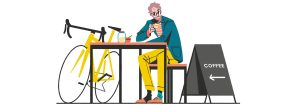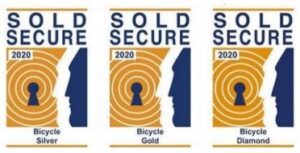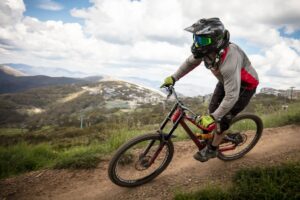The role of recovery and it’s secret to success
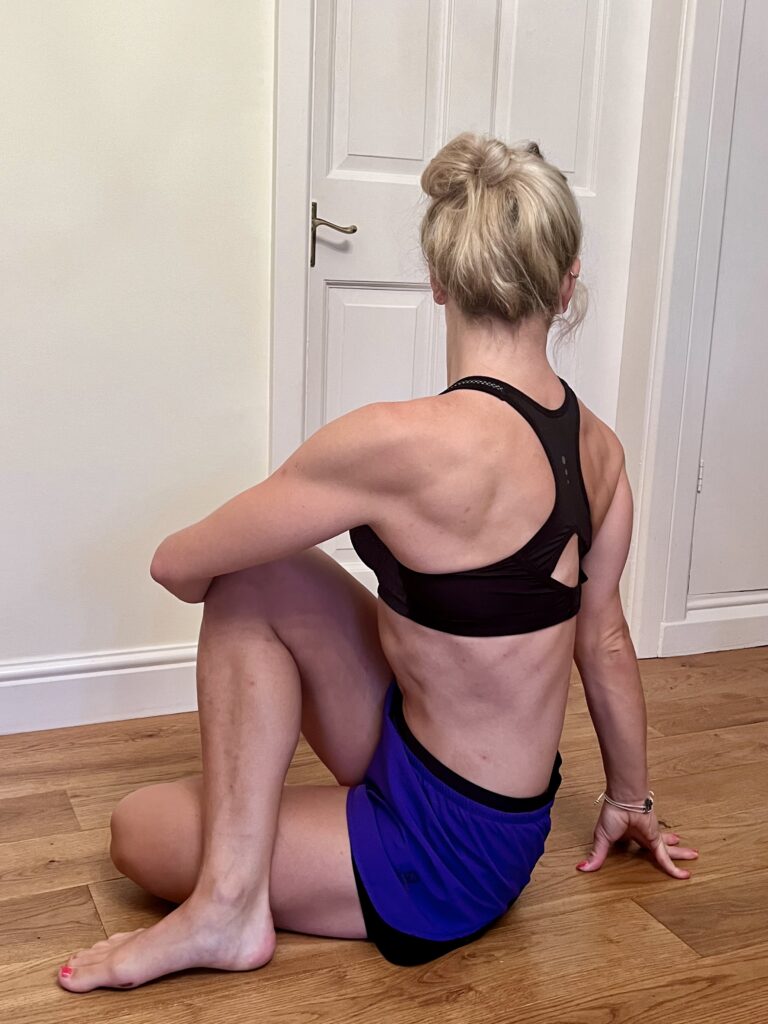
In this article, YJ x BTF Age group ambassador, Hayley Wells, talks us through the importance of recovery after training and what you can do to improve your athletic performance.
Many of us understand the role of recovery, but how many of us actually include it in our weekly training routine? Rest and recovery is an important part of training yet it is often neglected. Recovery is essential in order for our body to make adaptations and improvements from training sessions. Every athlete is different, some take a complete rest day or others might do an active recovery day e.g. easy swim/bike/yoga which will promote blood flow to the muscles to help with recovery. Still being relatively new to the sport, I am learning lessons on a regular basis and feel it’s important to share these with others.
I have always been sporty, from being a keen netballer when I was at school/college to fell running and now the world of triathlon/duathlon and time trialling. Stretching is always something I have been guilty of neglecting as part of my training and this was highlighted at the end of 2022 when I became coached by Ed at InBalance Coaching. Becoming a coached athlete allowed me to see where there were gaps in my training. After talking through a plan with Ed indicating my goals and what my current training programme looked like, he was able to build me a plan with proper structure, incorporating short, simple stretching and Pilates routines, keeping me accountable. I’d always thought you had to do weekly 1 hour sessions of yoga or Pilates in order for this kind of exercise to be worthwhile but boy was I wrong!

Another factor which was highlighted to me whilst being coached was the importance of incorporating Z2 training. I’d always been guilty of wanting to complete all my training at max effort, sometimes trying to fit too much into a schedule and then making up for missed sessions, which is a recipe for disaster! I learnt this the hard way when picking up Plantar Fasciitis in the summer of 2022 before I became coached. This was frustrating as I was unable to run which set me back for a few weeks. I went to see a local sports therapist (Aaron Lambley) who with his expert knowledge was able to help rehab my foot, enabling me to finish my first triathlon season on a positive note!
My biggest take away from this; slowing the pace of some sessions, especially during the winter is definitely the key to building a strong and efficient engine meaning you can still train but at lower intensity which in turns promotes recovery. Speed can then be built as the season approaches.

Over the six months I was coached, I gained knowledge on how to structure training properly, meaning every training session was effective for the right reasons without overloading the body. When to include recovery sessions/days, listening to the body and accepting that missed sessions happen. If you aren’t well instead of trying to ‘power through’ a session it is ok to reduce the target pace/power or totally skip it all together. We are all going to have those days when we feel invincible but these don’t come without the ‘off days’, and this is where understanding your body and not overdoing it can be key to success, in turn making you a better and healthier athlete.
Unfortunately being a coached athlete these days is a luxury and sadly one of the reasons I resorted back to being self-coached. So, my advice to anyone out there who cannot justify having a coach is to talk to others! Gaining knowledge from fellow athletes, training buddies and people around you in the most value information you can get. The internet is also another useful tool but just remember, no two people are the same, so take everything with a pinch of salt and adapt to your personal requirements to get the most of out your training.
Following trends from social media and Pro athletes opened my eyes up to another form of recovery – ice! With ice baths becoming more popular it got me thinking, how effective can this actually be!? So in the Summer of 2023 when I was at the Cycling Show I came across a company called, Riixo. Prior to attending the show, I had first seen the name Riixo being promoted through British Triathlon, so had a little bit of background knowledge but was eager to learn more. After speaking to Richard who was on the Riixo stand about their products, I was instantly sold and found myself walking away with a pair of Recovery Cuffs. This took things to the next level for me and I now religiously use the cuffs after key sessions on a weekly basis. They are without a doubt one of the best purchases I have made and have massively aided my recovery, allowing me to maintain a high performance level.
Riixo offer a range of ice recovery products ranging from ice balls, calf cuffs, back braces and more, designed to enhance your recovery and prepare you to go again. The beauty of their products is the practicality and this is why I find them such a great addition to my training. I can hop off the turbo or come back from a run, head straight to the freezer, pop on the cuffs and recovery starts straight away! A lot easier than having to jump in an ice bath!
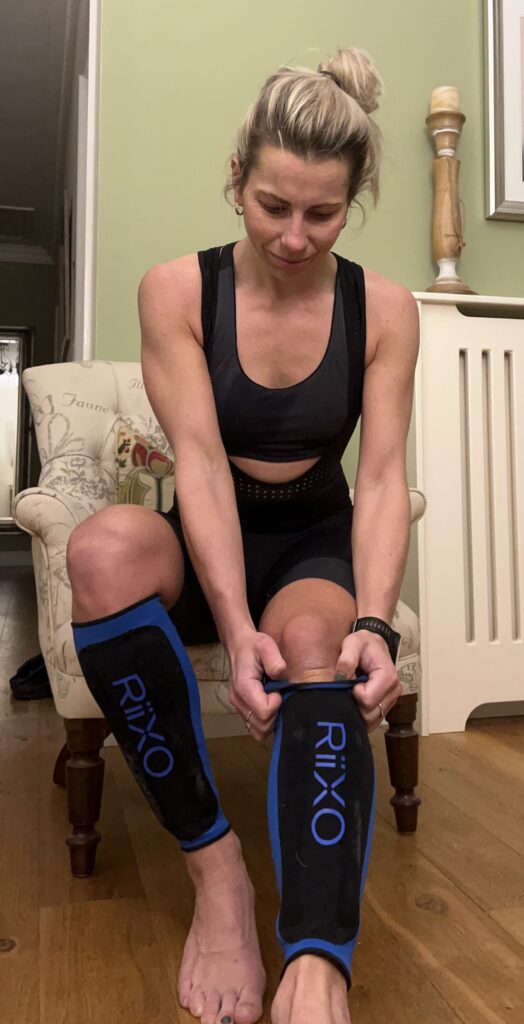
Always keen to learn more, I took the opportunity to take the Recovery quiz with Riixo via their website which gave some useful insights. Riixo then offered a free One-on-One Recovery Session which was a video call to discuss the results of the quiz. This was SO helpful! I learnt about the Golden Hour and its importance, highlighting areas of recovery I was excelling in, but also areas I was neglecting, allowing me to fine tune my recovery further. This tool is available for anyone and can be found on the Riixo website so would highly recommend you checking it out! https://riixo.com/score-your-recovery
Massage is another very useful recovery tool helping to release and reduce tension in muscles, improve circulation and encourage the removal of waste products, as well as relaxing the body. As a trained Sports Massage Therapist I would actively encourage anyone to incorporate a massage into the routine on a monthly basis. Sadly it is another luxury and isn’t the most accessible for everyone as costs can soon mount up, however the benefits are certainly non-negotiable. If massage isn’t an option, then making friends with a trusty foam roller or using a massage gun can also be useful recovery tools, alongside stretching and ice therapy.

I have been self-coached for over a year now, it can be tough at times, especially when the majority of my training is solo so I have to remain accountable, but having a strong mindset and a desire to achieve helps with this a lot. I am now very conscious to include a variety of recovery tools within my plan so that I can continue to keep on hitting my numbers in training, and be ready to race to my full potential when it matters. Not only do I feel better mentally for this, physically I am also recovering a lot quicker.
Nine months ago I joined a small group of awesome athletes, now friends, we call ourselves Wrekinsport Tri. Every Monday we come together as a group and smash out a solid swim session as well as going to Cross Country and Triathlon races together. We all have our own individual strengths and weaknesses across the three disciplines which we share to help improve each other, but the main thing is being able to have the social element within a training environment. Triathlon training can be very focused and lonely at times, so it is important to include variety in your sessions and train with others when you can. Always remember, we do this for FUN and for the love of the sport so don’t let it become a chore!
– Stretching = Easy to forget but so important. Just 10 minutes a day can make a difference.
– Massage = Once a month if this is viable.
– Eating well = Balanced diet. Ensure protein levels are topped up post training and energy stores replenished. My go to is chocolate milk!
– Drinking = Min 2l of water a day. Don’t underestimate the importance of salt tablets pre/during/post racing and training. I use Precision Fuel & Hydration and love their products. They also have a free online Fuel and Hydration Plan which is very useful, especially when planning race nutrition.
– Sleep = 7-9 hours per night. Good sleep increases performance, lowers resting HR, improves mood meaning you can perform better and allows muscles to repair. (Check out Hussain’s, blog on the importance of sleep here. He’s a fellow BTF x YJ ambassador!)
– Golden Hour = These are the steps you take 60-90 minutes immediately after an intense training session to optimise recovery.

